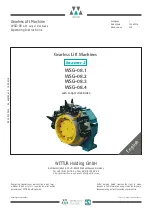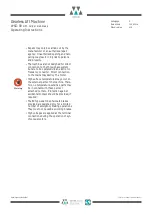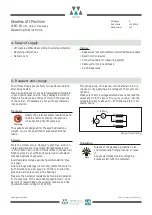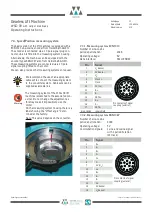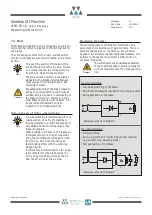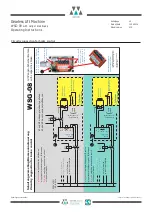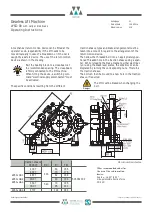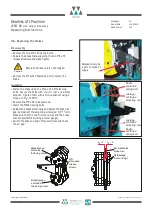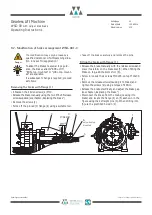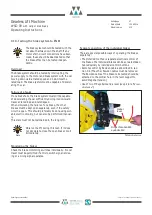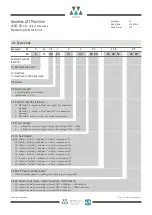
Gearless Lift Machine
WSG-08
with caliper disk brake
Operating Instructions
Seite/page
14
Datum/date
12.08.2016
Stand/version
0.18
Änderungen vorbehalten! Subject to changes without notice!
7.4. Brake
The brakes are supplied with d.c. voltage by an overexci-
tation rectifier which is installed in the terminal box for
the brakes.
The connecting contacts for the micro-switches which
monitor the brakes are also accommodated in this termi-
nal box.
To reduce the switch-off time, switching
can be effected from the d.c. side. Howev-
er, it is also required to provide switching
from the a.c. side at the same time)!
The overexcitation rectifier is supplied as
standard with a bridge installed between
contacts 3 and 4, meaning that a.c. side
switching is preset.
Repeated switching of the brake magnets
during the overexcitation period must be
avoided as this will result in overloading of
the brake control unit. Therefore, a mini-
mum brake operating time of approx. 1.5 –
2 s should be maintained during an
inspection or commissioning drive.
Note on the use of d.c./a.c. side switching:
A.c. side switching is recommended for nor-
mal operation, since the lift machine is
then decelerated in a controlled manner to
zero speed and the switching noise of the
brake is negligible.
When braking in the event of a breakdown
(emergency stop) or during an inspection
drive, the switching should be performed
from the d.c. side, since this ensures a
faster braking effect with the car being
stopped earlier.
It is therefore recommended to use 2 sepa-
rate contactors for the brake control cir-
cuitry, one of which switching at the d.c.
side, the other one at the a.c. side.
Note
Note
A.c. side switching
•
Low-noise switching of the brake
•
No protective measures required for switching contact
•
Slow application of the brake.
~
+
-
Br
D.c. side switching
•
Noisy switching
•
Burn-up protection for switching contact required
(e.g. varistor, free-wheeling diode)
•
Fast application of the brake.
-
+
Br
~
Monitoring the brakes
The switching state of the brakes is monitored using
dust-proof micro switches with gold contacts. The con-
tacts are designed as n.c. contacts, i.e. the contact is
opened if the armature is attracted (brake released). It is
possible to change the micro switch contacts into n.o.
contacts, if required.
The switches must be evaluated separately
for each partial brake to ensure compliance
with the requirements of the type examina-
tion.
Danger
Caution
Attention: schematic diagram !
Attention: schematic diagram !
Summary of Contents for Beamer 2 Series
Page 36: ......
Page 37: ......
Page 41: ......

